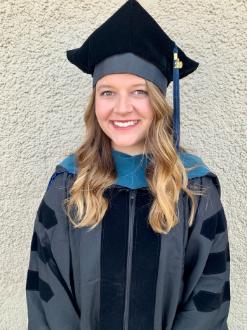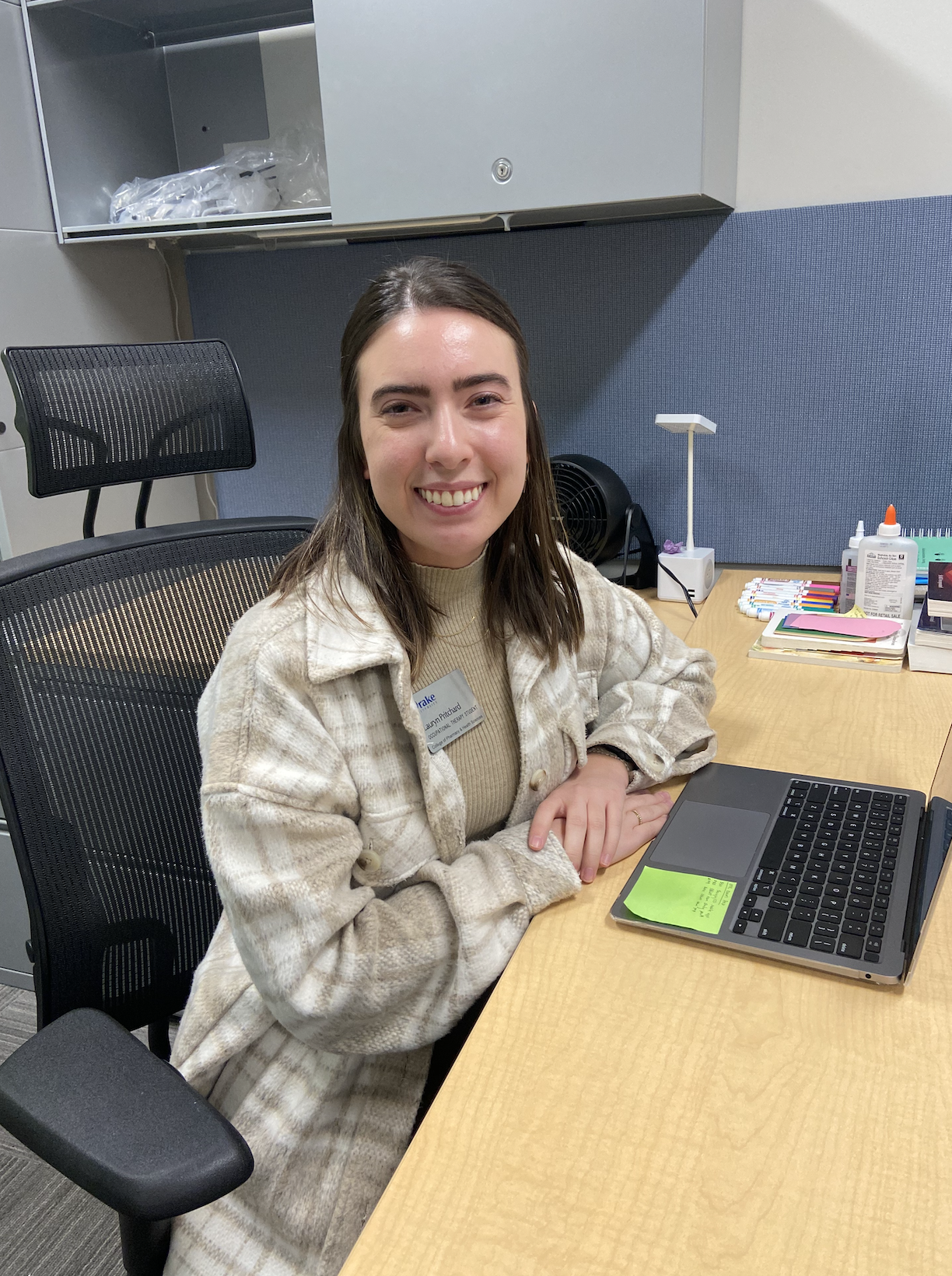Occupational Therapy Spotlight
Meet Elizabeth Riek. Elizabeth is a third-year student in Drake's Occupational Therpay Doctorate (OTD) program. In her last year in the OTD program, Elizabeth had the opportunity to complete her Doctoral Capstone at the University of Texas MD Anderson Cancer Center in Houston, TX.
 Name: Elizabeth Riek
Name: Elizabeth Riek Elizabeth recently finished her third year at Drake University’s Occupational Therapy Doctoral program. In 2013, she graduated from Truman State University with her Bachelors of Sciences in Health Science. Additionally, by background, she is a Certified Health Education Specialist. Her level IIA fieldwork was located at The Lake of the Ozarks in Missouri within inpatient and outpatient settings. Her level IIB fieldwork was located at the University of Iowa Hospital in the settings of Surgical and Neurological ICU, general oncology and women’s health oncology, and the stem cell transplant unit.
What is it about Occupational Therapy that attracts you? Why did you choose to pursue OT?
I grew up in a family that was greatly involved in healthcare and I always knew healthcare was where I would like to land. My brother and sister-in-law encouraged me to look into the occupational therapy profession, and once I shadowed an OT in college I knew this is the profession I wanted to be in. I love OT because you truly bring meaning to individuals’ lives and help them achieve personal, meaningful goals.
What are your professional goals as a future OT?
This has become a hard question for me to answer lately. I truly love a lot of different areas of occupational therapy. Long-term, I would love to work with oncology populations providing lymphedema services for survivors of breast cancer or working in an inpatient oncology setting.
Tell us about your capstone experience at MD Anderson Cancer Center. What were your responsibilities and what did a typical day/week look like?
My doctoral capstone site was MD Anderson Cancer Center located in Houston, Texas. I worked with the Director of Rehab, Dr. Braveman, designing materials for rehabilitation therapists to access to address the psycho-emotional components therapists may experience working with those in the oncology settings. I designed modules based around stress reduction, resiliency, and general wellness best practices. Additionally, I worked with top oncology programs across the country to survey best practices for stress reduction techniques for therapists in their institutions.
I worked closely with the leadership team within the rehabilitation services department at MD Anderson Cancer Center. My priority population included all staff within the department and focused on program development, leadership skills, and evidence based practice research.
My responsibilities at this site included helping the leadership team develop resources for the staff of the rehabilitation services department to combat the psycho-emotional stress they may experience working with oncology populations. Additionally, I met with various departments across MDACC to understand current practices and resources available to MDACC employees, resources being utilized nationwide by other oncology institutions, and creating activities sustainable to the rehabilitation services department at MDACC which staff could complete during meetings, out of the office, and promote community in the department.
Each day looked quite different from one another. Often times I would meet with departments at MDACC such as Employee health and wellness, the Employee Assistance Program, or different professional departments such as with the Social Workers Department. Some days I would meet with departmental leadership teams at institutions such as Ohio State University or Moffitt Cancer Center. Some days could be filled with observing therapists at MDACC and discussing with them their needs at MDACC. Other days I was busy designing modules on Canvas for therapists to access. Lastly, I would spend time at the research medical library working with researchers about best practices to reduce stress and presenting this research to the leadership team at MDACC rehabilitation services department.
How did Drake prepare you for your capstone experience?
Drake provided me with an excellent background in research and best evidence based practice. I felt this gave me a significant “boost” at my location as I spent hours, and sometimes days, researching best practices to introduce to the therapists. Drake gave me confidence to present this research and best practices to therapists with ease. I greatly appreciated this with my capstone experience.
What was your biggest lesson from this fieldword experience?
Sometimes, you are not going to have a perfect plan to tackle a project and that is okay. In fact, sometimes your “perfect plan” is completely wrong. You may have to leap before you are fully prepared and that may feel out of your comfort zone, but it could be a very necessary step. This capstone project gave me so many life lessons in flexibility and confidence. It’s okay to not fully understand and reach out to resources. Learning from leaders across our country was truly inspiring and encouraging as a young (almost) professional. You always have room to learn and grow.
What was your favorite part of your capstone?
I greatly enjoyed how welcoming the whole MD Anderson Cancer Center Institution was. They insured you felt very welcome and as part of the team, even as a student. My favorite memory was getting lost on a scavenger hunt to get to know the institution with my classmate, Emily Mock, who was additionally at this site. By the end of the day we had 18,000+ steps and discovered great Texas hospitality.
Why did you choose to attend Drake?
Drake quite literally filled me with a sense of being at home. The faculty are passionate, caring, and empathetic toward all students that walk through the doors. Even during the interview process, Dr. Rachel McHugh made sure I was still enjoying my visit to the Des Moines area as well as Drake’s Campus. In combination with current best practices and the faculty mentorship, Drake became home to me in the best way possible.
How are your experiences at Drake helping you to pursue your career goals?
Drake University challenged me and pushed me out of my comfort zone to prepare me as a professional. Between working in the Des Moines community, continuing to work with the Drake campus community, and working with individuals in specialized populations, all experiences greatly prepared me for my future. Drake instilled in me confidence, evidence-based practice knowledge, and soft skills which aided me in my future and have helped me develop as an individual.
What are some of your accomplishments at Drake and in the OTD program?
While at Drake University, I completed the training and education to become a Certified Lymphedema Therapist. I feel this provided me with an additional knowledge skillset which I could utilize in my fieldwork settings.
Share a few things you've liked most about your time at Drake and in the OTD program.
I loved the mentorship provided by the professors at Drake University. The faculty truly cared about how you were doing mentally, physically, and emotionally. Additionally, I had the opportunity to work with the Harkin Institute at Drake University and increasing the accessibility of the Institute. This was such a joyful and meaningful project for the Drake community, the Des Moines community, and anyone who would come to visit this area in the library at Drake University.
Some of my favorite Drake memories include times around the practicums during final week. My classmates would often come together truly as a family to insure each succeeded and was confident walking into a practicum. This is so meaningful and telling of the values of the individuals in the program.
What is one piece of advice you would give to future OT students?
This is the one time in your life you will be surrounded by those who are equally as passionate about occupational therapy and you get to sit in the same room with them for two years. Use this time wisely and listen to those with different ideas around you. You have so many individuals with different backgrounds, a whole lot of creativity, and passion which could arguably be unmatched. Your cohort will provide you with perspectives and ideas which are important to propel the future of occupational therapy. They’re your OT family, and you will be thankful for their (sometimes whacky) perspectives, love, and compassion in the future.


